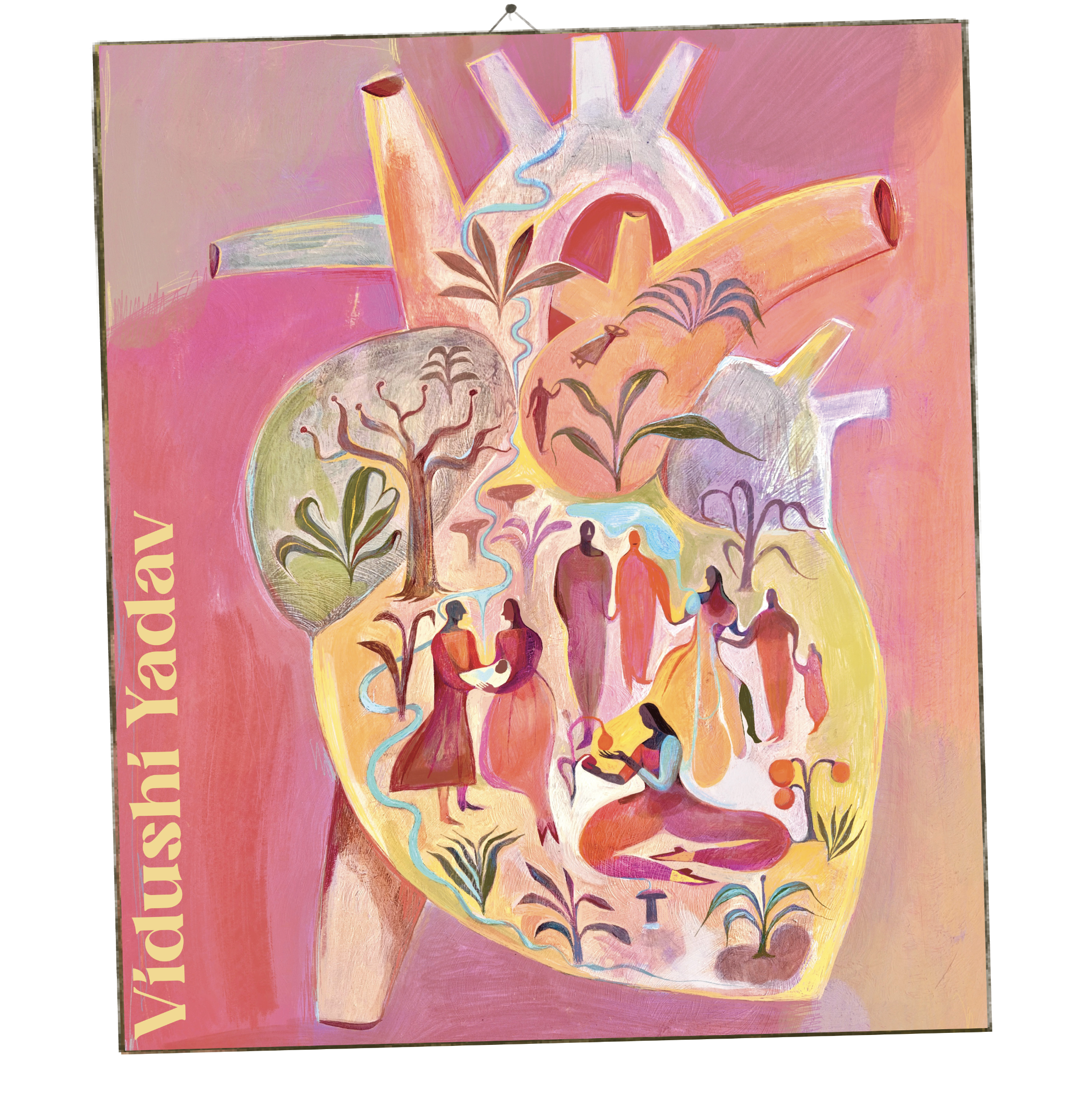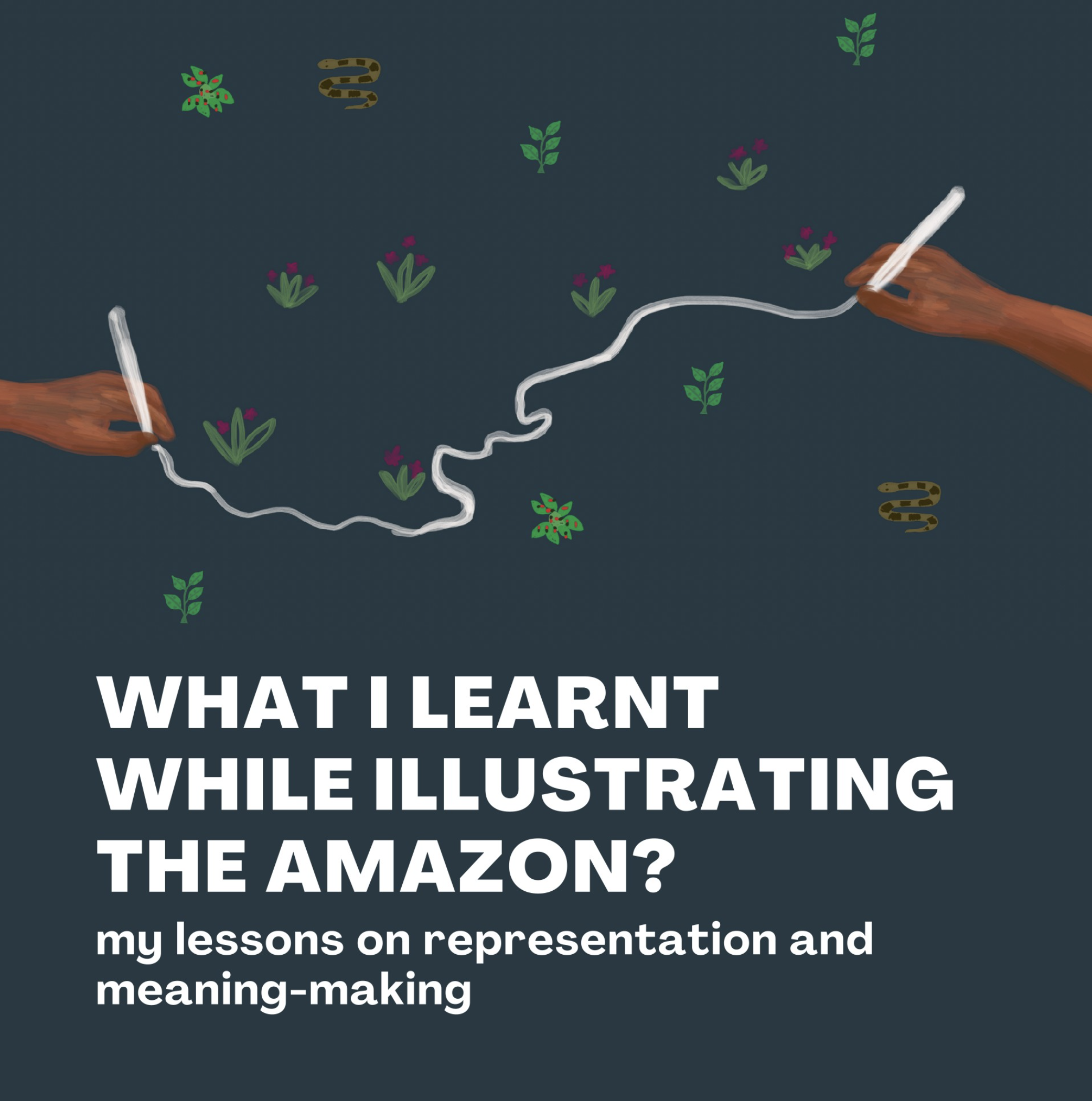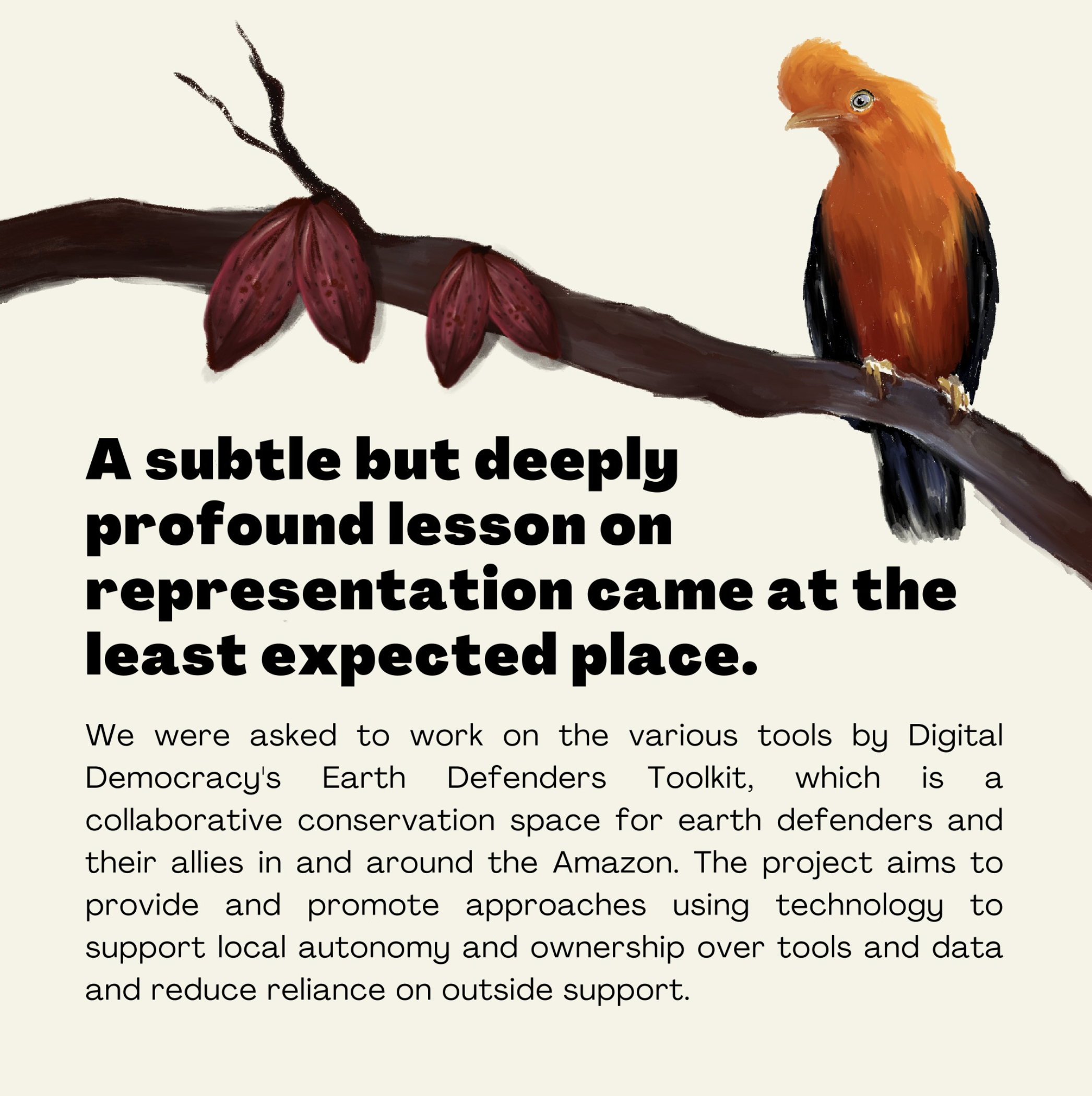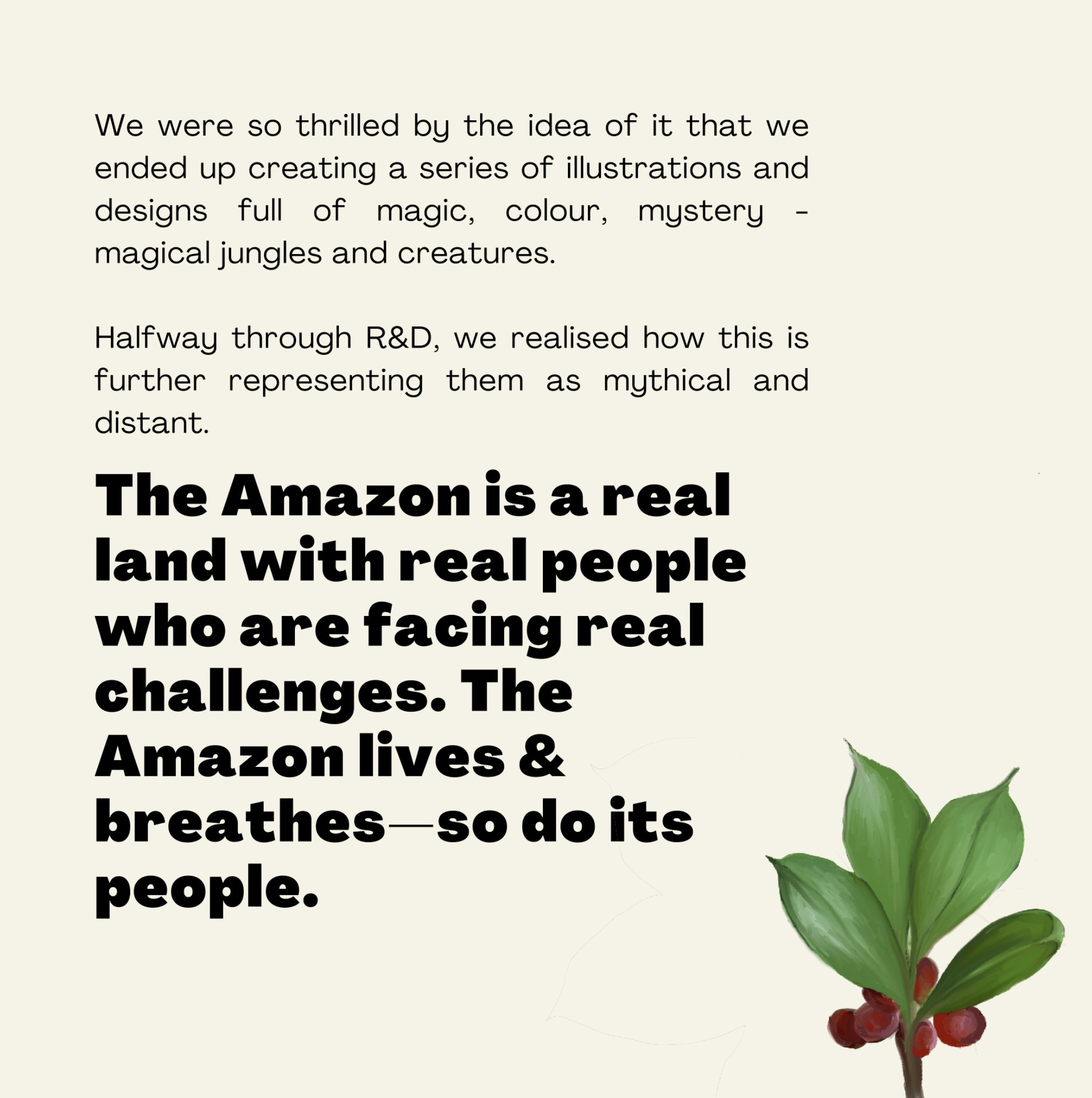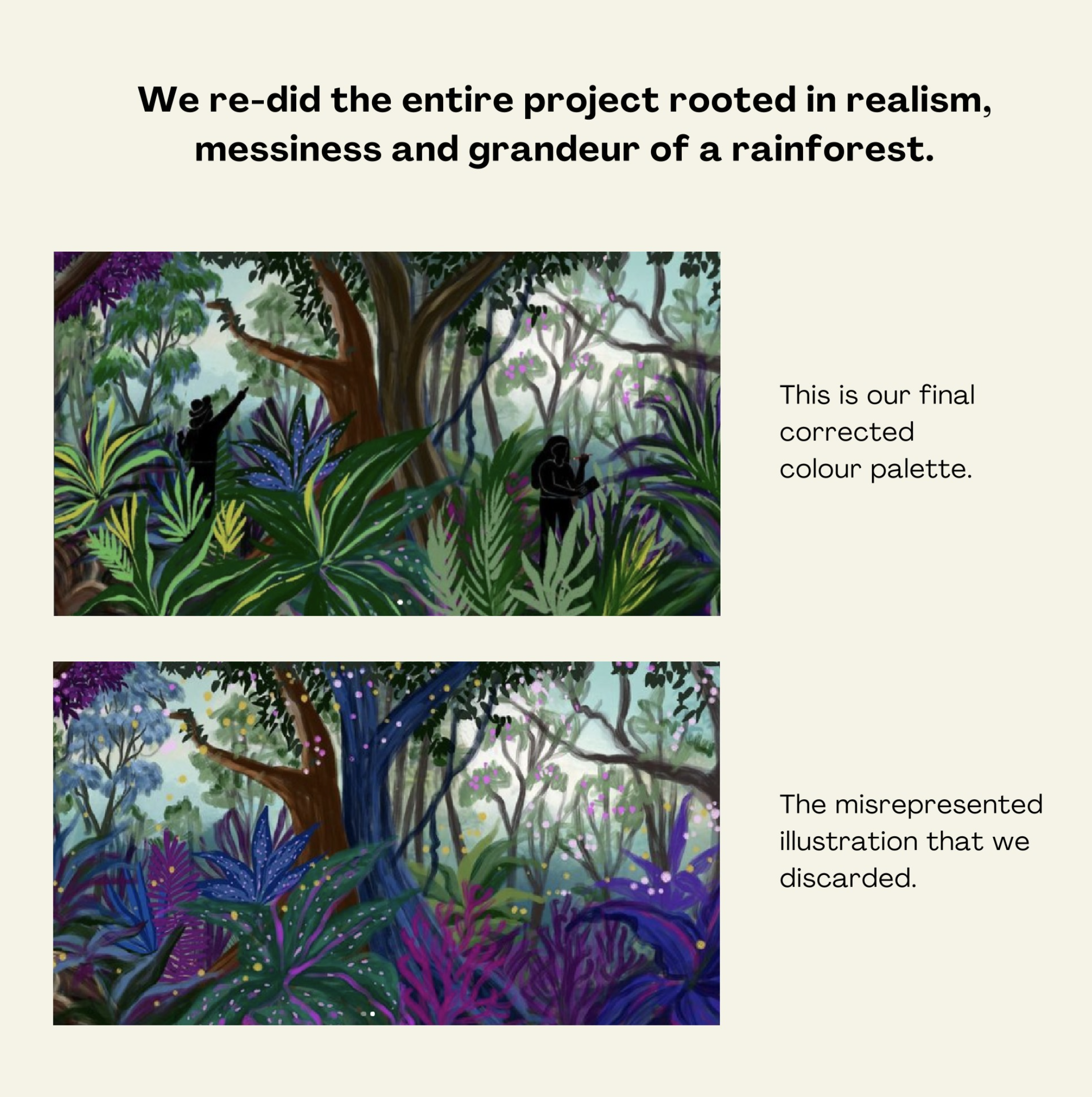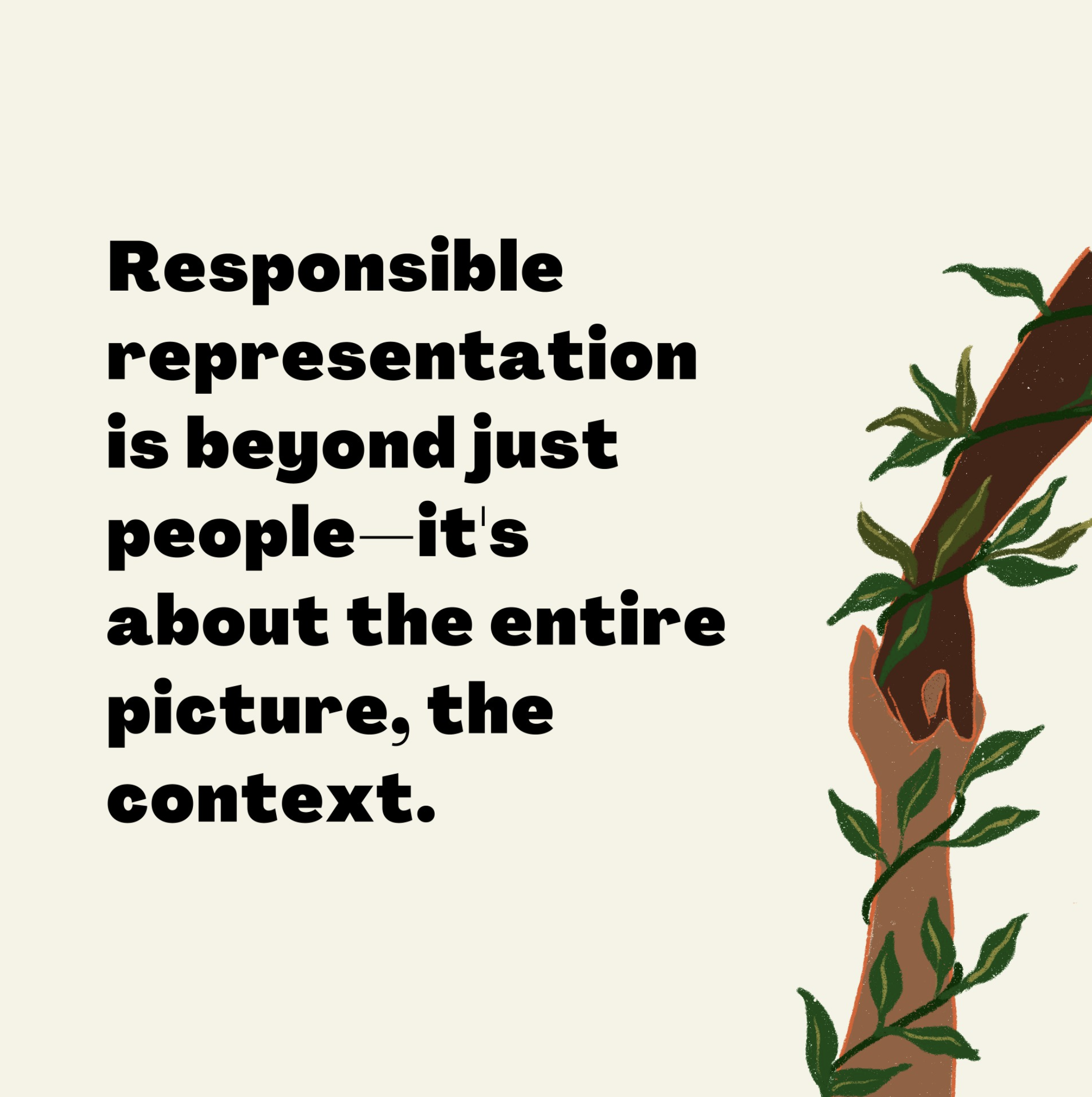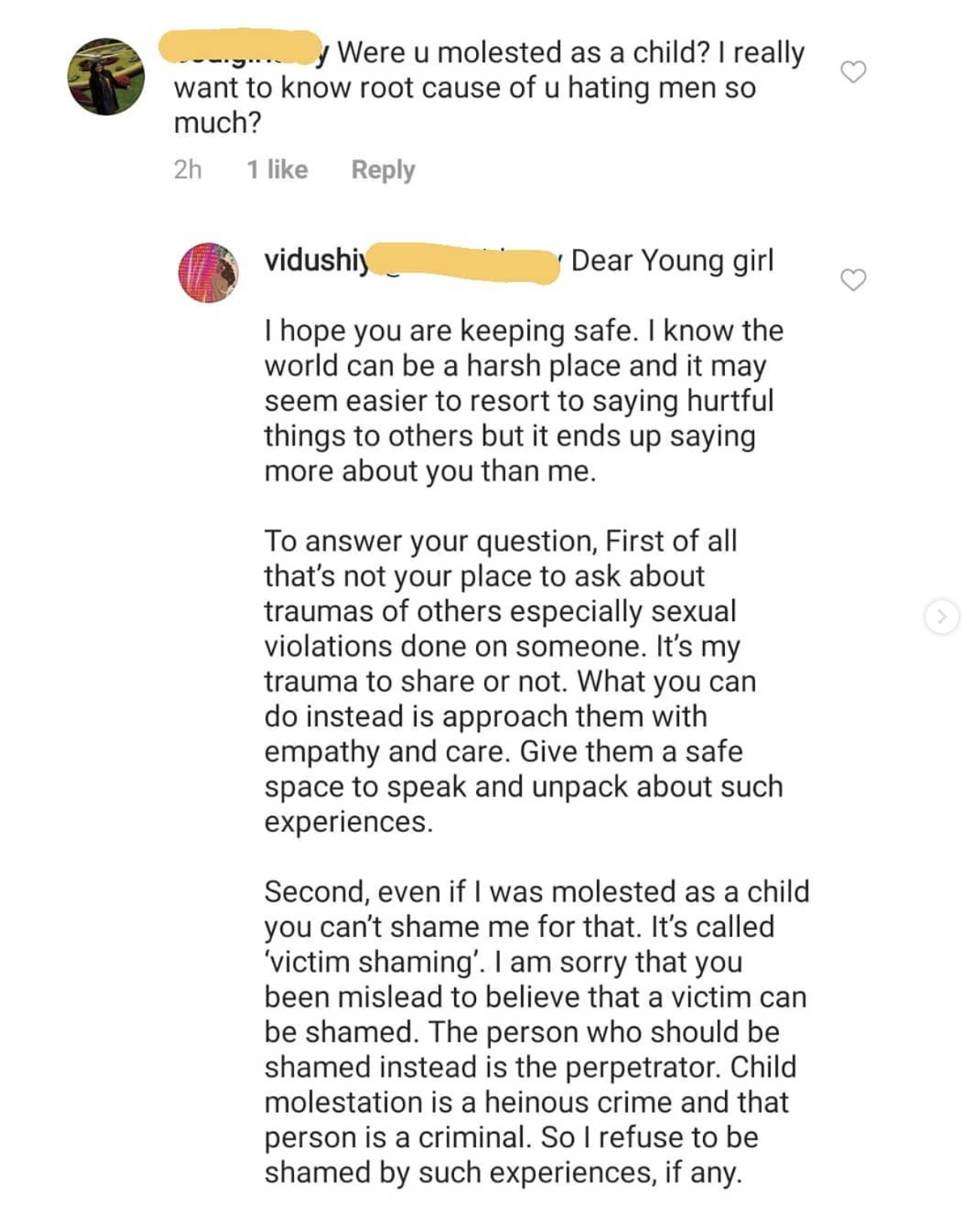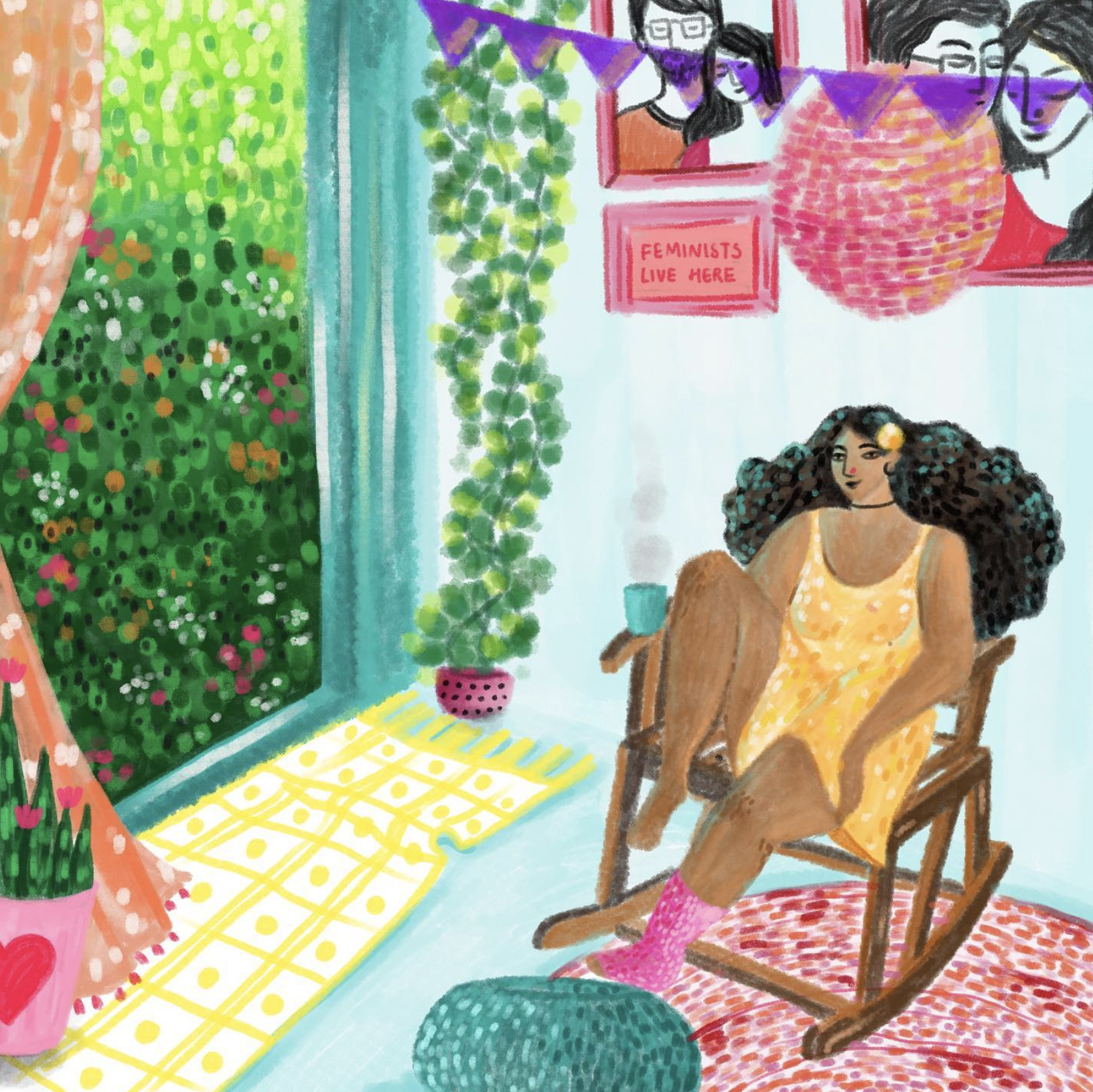Episode 4: Vidushi Yadav on deep communication in the social media era, what real representation looks like, & how to lead with love
For Episode 4 of The Heart Gallery Podcast, Rebeka Ryvola de Kremer talks to "artivist" Vidushi Yadav.
Vidushi’s work revolves around gender justice, South Asian identity, access & right-based content. She is a communication & design consultant for multiple women rights, humanitarian & development organizations world-wide. Through her work she attempts to investigate gaze, representation, able-ism, gender binary, privilege & colonialism via image making. Listen to hear critical lessons & perspectives from Vidushi Yadav.
Visit The Heart Gallery's visual accompaniment for this podcast episode here (podcast transcript also available here).
HW from Vidushi: Ask questions. And do not accept what is given to you, or what is considered the default of life. Ask, “why do I have to be like this” if something doesn't feel right. Examine where answers are coming from & look beyond the answers which are readily available. For example, there are so many things that we are told as women, like, “this is how you should be, this is how you should behave, this is what you shouldn't do, that's what you should do”. If you start asking questions, like, “why is it important for me to do this", or "what is stopping me to do that”… you can get closer & closer to what feels authentic to you.
See the work of Vidushi’s favorite artists Frida Kahlo & Marina Abramović.
Books mentioned:
- How to Do Nothing: Resisting the Attention Economy, by Jenny Odell.
- Seeing Like A Feminist, by Nivedita Menon.
Connect with us @vidushiy & @rebekaryvola.
Thank you Samuel Cunningham for podcast editing.
Thank you Cosmo Sheldrake for use of his song Pelicans We.
Podcast art by Rebeka Ryvola de Kremer.
And be sure to read about & view Vidushi’s three pivotal pieces below…
3 heart moves with Vidushi Yadav:
To provide a visual accompaniment to your listening of The Heart Gallery Podcast Episode 4, here are 3 pieces of Vidushi’s that are significant in some kind of way to her life, perspectives, and career:
#1: Amazon artwork for digital democracy, 2022.
“This project was about the Amazon rainforest and people living there. When I got this project I was really happy. I had this image of the Amazon as this magical, beautiful place. I started drawing with that understanding. In the middle of the project, some research led me to realize that I was mystifying the people of the Amazon. I realized, “these are real people, with real challenges, not some holiday-vacation kind of place & people, just a mysterious jungle for us to look at”. What I was doing by representing the Amazon with vibrant colors, fireflies, and so forth, was strengthening a harmful narrative towards people there. I started the project over. That was an important lesson for me: to not take my gaze to people and their stories. An important lesson in representing a place, a geography, people. The Amazon is a living geography, and it’s changing so much, so much extraction is happening. It was important to represent it in its actuality, in its reality.”
#2: Art series examining rape incident, 2021.
“There was an incident here in India where a young girl was raped by upper caste men. There was a huge media frenzy on that incident - Indian media is a circus, and how they sensationalize these stories is really horrible. I started asking, “what the right way to tell these types of stories to not re-traumatize those involved?” Asking this question led me unpack how such very sensitive incidents should be talked about. All the news are full of images of that girl with so many pipes coming out of her, very sad images. I didn’t want to focus on her moment of assault. So my image shows her going to cut grass in a field, which is what she was going to do before the incident. I wanted to focus on her living her life.”
See Vidushi’s post for her whole visual story, which comes with a trigger warning.
#3: Reply to a young girl, 2020.
“A girl asked me on instagram why I hate men so much, if it was because I was sexually assaulted. I sat with that question, and wrote a post about that answer. It was interesting, because many people wrote me as a result of that post, and it ended up being quite healing. I think a part of that learning was processing why people might think that women having agency & power, or believing in their own agency and power, means that men have to have less. I think I typically would have gotten hurt by such a question on social media, but by probing deeply - and by being at a certain stage in life - I was able to find healing through investigation. It also helped me see that people asking hurtful questions are actually hurting themselves. This was a lesson in responding from a place of radical love.”
Podcast transcript:
Note: Transcripts are generated in collaboration with Youtube video captioning and ChatGP3 and are not extensively edited.
[Music]
Hello and welcome back to the Heart gallery podcast, with me, Rebeka Ryvola de Kremer.
I have worked as an artist, creative advisor, and visual communicator in the climate and humanitarian space for over a decade, and also have a personal art practice where I explore relationships between individuals, other living beings, and our earth. I created this podcast to inquire into the various roles that art can play in helping us create deeper connections with our environment and others - both human and more-than-human. Listen to hear from other artists engaging in these interrelationships with all kinds of approaches, philosophies, and hopes for the future of humanity and our planet, and learn about different ways that art can help create change.
In this episode I talk to Vidushi Yadav. Vidushi is a south asian feminist Artivist, Illustrator, Visual designer and a researcher. Her work revolves around gender justice, south asian identity, access and right based content. She has been a communication and design consultant at multiple women rights, humanitarian and development organisations world wide. Through her work she attempts to investigate gaze, representation, able-ism, gender binary, privilege and colonialism via image making. She works from her studio in Jaipur, India, with her team of queer and disability rights activists and artists passionate about making the world an inclusive place - one image at a time.
Vidushi’s work has affected how I conduct myself in my own art-based communication work for organizations with humanitarian, social change, and climate adaptation missions. I wish for so many of the organizations, companies, and individuals I have encountered and observed throughout my career to reflect on the guidances she provides embedded in her signature, vibrant, arresting visuals and to incorporate her teachings into their own work.
I am so happy and honored to be speaking with her today.
[music]
R: Welcome to The Heart Gallery podcast, it's so nice to be seeing you.
V: Hi, I am so honored to be here, and I love your work and I'm sure this podcast is going to be amazing. I am so happy to be a part of it, talking to you here. I'm so grateful yeah
R: I'm so grateful to have you here and I love your work too. It's funny, I have such a complicated relationship with social media - as I think many people do, if not all of us. I think once a day, or more than once a day, I think about like, oh I should just figure out how to leave social media. You know, I feel like it's just nicer to be in the world, to be in nature, to be creating. But then, also like once a day at least, I go on Instagram (or you know some other social media place) and I see artwork (typically artwork - maybe sometimes it's something non-art related), and the artwork is what pulls me back in. More than the artwork it's the artists that I have found through social media who I don't think I probably would have a chance to encounter otherwise. Or it would just be less likely. Your work is exactly that.
Before we started recording I was telling you that I think I saw your work for the first time on LinkedIn, of all places. I don't even know why I was on LinkedIn. LinkedIn is one of those places where I just don't know what I get from it. Except recently, what I've been getting from it is exposure to your creations! What you're sharing on LinkedIn is really special, unlike anything that LinkedIn has ever seen before, I believe.
You have these beautiful visual stories. I would call them visual stories: usually there's like some kind of ecosystem of people co-creating. It's very vibrant, it's very colorful. Sometimes you have multi-slide stories where you have text, where you're interpreting different ideas and your themes usually around feminism. There's some threads of ecology, there's justice, there's this idea that we can co-create a new kind of world. And you show it so beautifully.
I'm wondering, what is your relationship with social media and how did you come to be sharing this kind of content?
V: That is such a nice question to start with. I would say that my relationship is very complicated. So many times I've, you know, thought about leaving social media because it really affects my well-being. It has its way of pulling me especially Instagram. I watch so many artists, and so many amazing things I discover, but I also get sucked into watching reels for hours only to realize, oh my gosh what am I doing! I have a complicated relationship with sleep, with getting out of social media, and just basically reminding myself that I don't need to watch and consume so much of content…
It has been a struggle for me to manage my time with social media. What I've recently last year done is I have built a team who helps me with social media so that I'm not doing it all alone. And this has helped me a little bit with how I manage my time with social media and how much I consume versus how much I create. Apart from that, I think another important factor of social media, especially for us as artists, is what are we creating for? Almost every day wonder, “am I creating for social media or am I creating for their algorithms”. For, you know, how much pressure they put on us with their ideas of productivity and posting something every day. Just posting content for the sake of posting. So almost everyday I wonder, “what value does it provide?” And of course it provides a lot of value, but it also takes so much away from us so it's a question. It's a living question that I have to answer and ask myself every single day.
R: How do you reconcile it right now? You've identified some of the feelings that I have as well, and it seems like you're weighing the pros and cons all the time… Right now - I'm curious - it seems like the pros are outweighing the cons because you're creating so much. I'm always astounded at how much you're sharing. So you think that it's worth it?
V: Yeah, I mean I have so many people I have conversations with daily. I learn from them on social media, and like you said I wouldn't have found them otherwise. So there is a very strong value that it provides me and my work. I definitely want my work to be reaching people, to be read by people, and to be consumed by by people… But I always question the how of it. I do post a lot, and like I said, my team really helps me in figuring it out in the timing and all of that. I also do have a couple of softwares which automate the whole process so that it's less you know less complicated for everyone. That is definitely there.
So I create a lot of things, and I create for a very specific target audience. I want them to engage with my posts and I want them to ask questions and I want me to ask questions to them and just engage in meaningful ways. Social media, as of now, is my major platform. I'm also figuring out what can be the next step. Leaving social media also sounds very tempting. So it's all of these things together.
R: there's these two two threads that I want to pick up on: You're talking about this question of “am I creating for social media”, which is such a good one to be asking for all of us who are spending any time there and sharing on there… It's one that, gosh it's one that I've struggled with so much and I don't have the audience that you do. Recently with the algorithm changes the last couple years I found that the work that I really care about, that I feel like, “oh there's something here, I think I'm going in some kind of direction that I'm excited about” - that never resonates. So I've started to feel that this is a part of the reason I'm doing the podcast: because I've just stopped feeling like I'm able to grasp that Community. To access a community where I'm having, I guess constructive dialogue. Where I'm providing something super meaningful through social media. I thought, okay like I'll get onto a different platform, you know take control of this in a different kind of way. Get away from these algorithms, from these capitalistic entities. They're trying to make us create for them.
I'm wondering how you've worked through that, because it seems like you really do have an audience that is excited about what you're making. I'm wondering how you did that? Is that audience what is helping you make sure you're not creating for the algorithm for example?
V: yeah I mean I love this question. I think now that you have said this, I think the audience that I have has a major role in understanding that I'm not creating for social media. Or managing how I'm creating, and over the period of time I have realized that there were audiences there were people who sort of followed me but they also unfollowed me because I didn't post very regularly at a point when I did not have the capacity to. Or [when] I did not cater to certain trends. Or, you know, I just wanted to be true to what really resonates with my heart… Over the period of time people who wanted such content, they came and they they left, because my content was, no my art - I won't I won't call it content either - it's just that it has a critical lens, you know? It analyzes how women are portrayed, how people from Global South are portrayed, how are you telling somebody's story, do you even have the agency to tell that story? Through my work I ask all these questions and on social media there are a lot of people who are looking for a quick two-minutes of entertainment.
I always say that I wouldn't have that kind of audience, you know, a millions-of-people-type audience, because I'm not creating a two minute recipe, I'm not I'm not a dance video type. I want people to come and sit with the questions that I have, to see the world and reflect on if there is anything they relate to.
So I would say that my work has a lot of, I don't know what that word is…you come and sit with certain feelings. I don't think I create for social media trends, and I don't think I can do that. I don't think I have the capacity to or the skill too, or the intent to either. And there's a lot of magic and slowness, and I want to sort of like sit with the thoughts. I want to write those thoughts you know stay with those thoughts for months maybe weeks maybe years and then sort of like something will stem out of that. It's it's very organic for me, and social media cannot be organic. R: R: Yeah there is such a magic in slowness, and I'm grateful that you said that. I think that even though these algorithms can sometimes feel very powerful, and the forces at play can feel like they're just too much for little people, little artists to go up against, the fact is, I feel like you're touching on the fact that many people are just hungering for something different.
Maybe they're not willing to leave that space, and maybe they don't want to leave that space because they do find some value there. The fact that what you're offering is available and is connecting with those people, is just wonderful.
I hope that we can continue this battle, I guess. I don't know if we should use a violent terminology; it's more like a peaceful protest against these um capitalistic social media forces.
V: Absolutely absolutely this is a peaceful protest against the bigger force. I think the biggest force of our time, which is social media, and and there's so much that we fight against. Those battles are most mostly internal. We are reclaiming our space, reclaiming our time, reclaiming our ways of being, reclaiming how not to get affected by [social media forces]. Of people having the best of Life on social media. It is an uphill battle.
R: In addition to all those reclamations that you just said I think another one that you're a part of is reclaiming thoughts, thinking, and critical thinking. That's such a big one. You're reminding me of this book that I love by a woman named Jenny Odell. the book is called How To Do Nothing. My mom sent it to me. I remember thinking, oh like what is this, it sounds like one of these self-help books. But it's not at all. Jenny is an artist, she lives in the San Francisco Bay Area. She's also a professor and she examines social media's impact on our lives in addition to many other things - she does so much - and one of her points in this book is we need to reclaim the space to not be influenced. To not be having our thoughts shaped and every time we're on our phone. Unless we're like on Google Maps, or, I don't know, we're having our thoughts affected by someone else, by a non-being. If social media can have spaces where people like you are providing that pause where people can realize what they're within and the broader systems that they're within, it's very powerful.
I'm curious, Vishusi, how did you come to be interested in these issues that you talk about? You you mentioned feminism, I know that a lot of your work touches on patriarchy, you touch on voices from the Global South, agency of different types of people… Can you tell me where that interest came from? How did you become such an advocate and activist?
V: So I don't know if many people know this, but I started this by looking at films and media from a critical feminist lens. I am from an animation background - I used to be an animator. I've made a couple of films, and it was a very interesting thing for me to see how women were portrayed - are portrayed - in films and in the media. That is where I started from, very organically, and it sort of moved from just women to all the marginalized communities and seeing that in the bigger picture. I started seeing a similar pattern in the portrayal of transgender folks, and people from India who are from dalits, orn people who are from Global south in general, or other marginalized communities: people who are lgbtq - essentially [noticing] how they are portrayed in the media.
Women are stereotyped in a certain kind of work. They are stopped from entering into spaces and [noticing] became a very interesting practice for me. I started noticing this everywhere. Then I realized that, as a young artist, I have a lot to say and a lot to comment on.
My art and my images became a channel of that commentary. With time I slowly came in contact with a lot of humanitarian and development organizations globally. I started seeing the same pattern in the portrayal of people from the Global South or people who are from my community - they looked at with the Western gaze where they're not understood properly. They were understood from a biased vantage point, very biased perspectives. They're taking away our stories.
I thought that it did not feel very authentic to me. I started sort of asking this question about how do we change this narrative or how do we shift this narrative where all the people all the women all the marginalized communities in so many different ways are portrayed in such a victimhood globally so that is where it all started from. Now I work with many uh organizations. I have created a couple checklists, you can say, which are like a mantra of authentic storytelling, how to practice authentic storytelling. This is how it started and and it's still a very living practice.
I'm still asking a lot of questions. I'm still finding a lot of answers. I don't have all the answers but I'm sort of like, through my work, through my practices, I'm sort of finding those answers. I'm very grateful that a lot of organizations are taking interest in what I'm doing. But I think a lot of uh like especially the International Development sector has a long way to go. Because most of the images they use they never thought about it how inauthentic, how traumatizing it is especially for the people who are who they are saying they are going to serve so yeah there's there's a lot that can happen.
R: Could you share some examples of what some of these portrayals look like or have looked like? V: yeah so many I also won't say names, but I don't think that's relevant either because you will see that most of these organizations, humanitarian organizations, especially Global ones if you go to their website, if you see their communications, you will see that most of these images are very pity inducing, you know like hungry children that are not even clothed properly, they are sort of like covered in mud. Really sad images. They're looking like they're waiting for help from a white person or from somebody who looks like they belong to a Western Country.
I don't know if it's intentional, or if it's their way of seeing, but if it's very inauthentic. I'm not saying that marginalized communities are not systemically oppressed - of course they are - but they are not victims,they are full humans, they have all these ranges of emotions and experiences and not just waiting for help.
I also feel that when you do this you take so much of their agency away from them and you'll see that all these ngos have these kind of images they just sort of like I understand that they are looking for funding but there may be other ways of you know they they can be so many other ways of getting money other than just portraying a hungry child or a woman in need of food and clothing for their family and children. I feel that these women and these children are literally around me and when I see them or interact with them they are not those people which I see them which I see on the websites or on the communications of these International ngos, which is so inaccurate and wrong and there can be so many other ways of telling their stories authentically.
R: what kind of experiences have you had with some of these organizations, like where maybe you you reached out or someone reached out to you asking you to get involved? How do you navigate that space where you start to maybe show them for the first time that this is going on within their communications and their perspective of the people they're working with, with their view of the world? How do you navigate that? Or do you feel like the organizations that you have a chance to work with that they're already kind of gaining that awareness on their own?
V: I would say that a lot of my work started on social media. When I started highlighting these things on social media that how… I remember having a post where I posted this critical analysis on Instagram about how sexual assault victims are portrayed and I remember a lot of people messaged me after that post saying that they totally agree and they were either one of those sexual assault victims or they were on the other hand the organizations who were portraying them.
Both of these side of people told the same story: that they didn't know what was wrong, but they felt there was something wrong that they could not articulate. But that whatever I wrote made so much sense. This is just one example. So I think a lot of my work started with advocacy of this kind where it was just me self-funded doing this work on social media.
A lot of organizations came to me when they discovered my work through that, I would say, which sort of saved me from getting into this battle where I am sort of advocating for what I'm saying. They already saw sense in that. When I'm saying these organizations, I do not mean like really Global organizations, but what I mean is smaller organizations, independent organizations. I can take some names which are doing really good work like Frida, Urgent Action Fund Asia and Pacific, and there are a couple of East African organizations who are doing really good work.
They are taking they sort of free claiming their stories of their own people and they are showing the way to all these bigger organizations that you can do it, that there are better ways, you know of portraying these people through images, through words. It actually shows where your intentions are and how much do you care about these people. So a lot of these organizations who saw sense in this work came to me and then it started a chain reaction. With time … this very focused work is not more than three years old… and yeah within this time I have a lot of organizations that I worked with. Hopefully there'll be more on a bigger platforms and bigger organizations who will see with time.
R: There will be more, I'm sure of it. One thing I missed in your story when you were taking us back was how you started to use art as a way to communicate about some of these issues. Where did the art come in? Were you always creating? Did you just connect those two? How did that connection come about in your mind?
V: So I was an artist before I mean I have always been an artist. I was in the animation I used to create small little animations. These ideas of representation started with a couple of books that I've read. One of it was by an Indian author called Seeing Like A Feminist [by Nivedita Menon]. It's an amazing book for anyone who wants to sort of uh start seeing like a feminist, and it's very beginner friendly as well. I just randomly picked this books because I was organically very interested in sort of shifting that lens. And then that sort of seeped in to my work, into anything that I was creating. I don't think I was ever even good a it, I was never very good at creating beautiful pictures of a sky or flowers or just painting beautiful pictures, which so many other artists are ( I'm so inspired by them), but I would say that this was my space I think which sort of like happened organically
R: You say that you you feel like you're not the artist who's creating the beautiful sky… your style is so distinctive and I marvel at these complex worlds that you manage to create. Whoever's listening, please like you have to go look up Vidushi’s work right now, or after the podcast, it's these incredibly complex interwoven - like there's so much weaving happening - you create these systems, but it's like layers of systems within one visual, sometimes, and you'll have people, an environment, and landscape, and then you'll have all these forces at play illustrating like how people are affected by external factors… You'll have descriptions showing how people are connected to each other, and you'll have a thesis very typically within the visual.You'll have some kind of broader point, and I think that's quite incredible. How did you come to be such a proficient communicator of information, because that's another piece right? Like, there's the art piece: your your works are captivating, you know the colors are strong and the characters are expressive and diverse and beautiful… how long did it take you - how did you figure out how to, you know, be such a good Weaver of a lot of information?
V: I don't know if I have a perfect answer for that. I mean it happened with time. It happened with practice, it happened with doing a lot of things really badly and figuring out how else I would do it, and more than that it came I think with an intent of telling a complex story in a way that I understood well. I think another aspect of my work, which is sort of hidden is that I always question that all this information, all these amazing ideas, they are sort of packed in the shiny boxes of academia, right? You'll find amazing information in the library or in a big conference paper, but it's not accessible to people who do not either speak that language or people who are systemically away from those spaces, who are not systemically, you know, allowed to enter those spaces. So how do you democratize that information how do you make it accessible to people who who do not want to read maybe 30 pages right? Of course this is much more complex than what I'm creating right now, but this has been my intent and a very important factor of my practice that I bring out this information and and social media right now is the platform. Social media now is where people are talking about skin care, hair care, and um good lipstick shades, and all those things. What happens when you put information like this which is so reflective, which is so moving, if you engage with it what happens when you put that information in a platform which is so open for all kinds of content? What are you doing when you're doing that like if you can sit with an image and look at it every time you'll find another information or another sort of you know story uh unfolding of what happens uh especially on social media where you know content is supposed to be consumed in like nanoseconds and moved on with the swipe.
I think that's a very important factor. I started with this question and I started putting more and more information in an image to uncover or unfold with time, with space. Every time you look at it you find something else.
R: You've found that as you've been building more and more layers of information into your work that your audience has stayed with you.
V: yeah and uh that is this thing. I was also honestly very surprised because of the same reason that you know typically people will say that you know make your in like like your content or whatever you're posting make it in such a way that it's very easily consumable. Like you look at it and you understand it sort of a kind of a thing, but the kind of work that I'm doing cannot be just that, it cannot be a two second engagement. You have to pause and reflect, and although if I see the data, I have a lot of unfollowers almost every single day, I also have a lot of followers every single day.
I have a certain audience which sort of engages with what I create, and I get so many DMS with very personal messages, like you know people who are going through a very difficult time in their life and they saw an artwork, and they felt good.
R: So that's huge and amazing. I mean that's the best thing we can hope for is artists, right? I do, I did, have one question about the impact of Art and how it can sometimes feel intangible, but you're receiving those testimonials from people, those direct messages, and what more could you want than that?
V: Sometimes these are the messages which are my fuel. There are people who felt misunderstood all their life and they write to me saying that they belonged somewhere by looking at something I created, which is huge. I also felt at some point in time that I don't belong here. Like I don't know if I can relate to what everybody else is feeling, or do I subscribe to this story that you know everybody has? It feels great when people write to me saying that you know uh whatever I created gives some kind of comfort to them or some kind of belonging to them.
R: It's amazing, it's a great reason, like that in itself is like, I mean stay on social media, keep doing what you're doing if you're receiving something like that, right, like that's just wonderful, and I'm wondering if the mantra that you mentioned before, to go back a little bit you mentioned that you created this mantra, does that also help keep you grounded and help you stay focused when you're surrounded by all this other content that you mentioned? Is that what you turn to?
V: yeah of course. This was like a principle kind of a thing - I had a living document, like living with every time I stumble upon something, like a new experience or a new understanding on representation this gets added to that, but I created a checklist for organizations who are especially trying to portray authentic stories of people from sort of like different gaze. From a western gaze, or from an upper class gaze, so I created a checklist of sorts, where it has a couple of points including, “do not be a hero of their story”, you know do not portray yourself as the hero or the savior. Or that they needed you to come into their life and save them.
Instead tell their story in a way that you are only a medium, you know, you're only a translator or a channel of their story without having your perspective. Or as authentically as possible. I think that is authentic inquiry, so that is sort of like one of my mantras as well. Especially when I'm talking about people who do not belong to my community, or with whom I don't share experiences. That is sort of like a checklist that keeps me grounded. It is on my social media for anyone who wants to find value in it, or want to be benefited from it.
R: everyone needs to see the checklist, the checklist is great. I saw it on LinkedIn and and I shared it with some colleagues that I do communication work with, because everyone needs to live by those rules, I believe, if they are lucky enough to get to be working on trying to change social systems, trying to change our relationships to other people, to the natural environment, so please check with this checklist, it's incredible.
I wonder if you've received any pushback, like if you in your experience… it seems like you're connecting with like-minded organizations that want what you're offering. They want to change, they want to do better… Have you received anything in the opposite direction?
V: yeah I have a couple of times. Mostly my reaction to that is that probably this is not the right time for this, maybe they're not ready for this, and you can't do anything about it. They either understand or not, so I have realized that I would rather focus my energies on organizations and people who genuinely try to reflect on their processes, on their practices and policies. I have realized that's a channel that I want to go through, you know doing the work that I currently do and hoping that things will change in future and that people will see what they need to see.
I have chosen to grow where you're planted, to do what you can at a particular point in time
R: Do you feel like this moment right now that we're living in is this a good time to be working on these issues? What is your sense?
V: I think it is a very exciting time to working on these things and especially with so many things happening around the world right like um you know if you see around you if you read about what's happening around the world and you will see that this like there cannot be more important time than this to do this work. Which makes this very challenging, but very important as well. It teaches you a lot, it teaches you so much more than work. It teaches you how to go into a battle with kindness and love and empathy, a battle which is so much larger than you are.
Just go with what you have and what I have is this imagination, that there can be another way. What happens when you enter into a space, which is so challenging, which has such a force, and you just have your kindness and your messages for your thoughts by your side…
This is why I write in my Instagram bio that I'm a radical lover: I really think that love is the way forward. If you see any situation with the eyes of love… I mean, if you tell me there's one answer I think the answer is love, radically loving all the parts that I wanted in this world.
R: I couldn't agree more, I love that so much that love is the answer, and that connects to a piece of yours that I saw recently about care, about rest, I believe for Frida that you did - the organization Frida - it was a multi-panel piece that you did on taking care of of people, of oneself, and of others, specifically in work contexts.
I'm wondering if you can speak to that cultural shift that we're seeing a little bit of I don't think it's mainstream, but also like how you take care of yourself because I think to love, to be a radical lover you have to be healthy in yourself on multiple levels. Can you speak to that?
V: yeah I mean I totally agree, you have to be healthy on so many levels and and it is very challenging especially with the kind of work that I do, with the kind of content that I deal with and create art for. Recently I did a project with content and stories of people who are going through extreme violence by state, by their intimate partners, by you know, so many systems on so many levels. It was so hard for me to not get myself affected by it or to not be reminded of my own similar traumas and my own seminal challenges of the past.
It is a very active practice I would say like to take care of myself in all of this and to take care of the people who are working with me now is a practice that I'm still learning. I'm still working on it, but I am 100 sure that I wanna take care of that more than anything else if it means that I'm sort of like pausing a little bit, if it means that I am disengaging or disconnecting myself a little bit, or if it means that I take active therapy every now and then, where I sort of unpack all these emotions.
I have so many questions, and it's so hard to sort of keep up the hope or the belief in this world where so many bad things are happening to so many people without any of their fault, but you’ve got to take care of yourself.
Whatever it takes, that should be the priority. I think if you take care of your heart, only then you can go out in the world with you know and with that sort of understanding that it is a powerful thing to have…
R: One of the questions I wanted to ask, that I'm trying to ask in every podcast is around art or artists that are inspiring and I wonder if you can share any artists that have had an impact on you throughout your life or maybe who you turn to when you're trying to take care of yourself?
V: yeah um so many of them so many including you, I love your crazy artworks. I would say that one is uh Frida [Kahlo] - she's amazing and the way she lived her life is an art in itself, with so much grace and with so much fight and beauty. That is Art in itself. Of course her work is also very inspiring.
There are so many contemporary artists I really really love. I'm forgetting the name of this artist, but she is an installation artist and she creates these installations with her body. She performs many experiential performances. That is also very amazing.
There are so many artists on Instagram that I follow and that I learn from as well.
R: we'll share those we'll share those we'll do some research and find out who the third artist and add to the show notes…
Just as a final question, I wonder if you - I mean you've provided so many tips, so much advice, so many pieces from your life perspective that I think people can get a lot from, but I'm wondering if you potentially have one thing that you want people to consider doing after listening to this podcast?
V: yeah, one very important thing that I've done all my life is to ask questions. I think it is such an important thing to begin to ask questions and not accept what is given to you, or what is considered the default of life. I would say that's the one thing that I would ask everyone to start doing: to ask questions, ask “why do I have to be like this” if something doesn't feel right.
R: How do you drill down, because there's like the surface level answer, right, that we can we can arrive to, but it can get really interesting when you keep digging.
V: yeah, I think digging happens when you're trying to not find that answer which is readily available, and really seeing where it's coming from. For example, there are so many things that we are told as women, that “this is how you should be, and this is how you should behave, this is what you shouldn't do, and that's what you should do”. If you start asking questions, like, “why is it important for me to do this, or what is stopping me to do this, what will happen if I go on and do this”... It’s not just asking questions, it's also trying to do what feels authentic to you. Understanding that so much is the system that we are living in, the systems we are told to live in, and what if you unsubscribe from them?
R: powerful and with that very powerful call to action, Vidushi, thank you so much. I hope that anyone listening goes and finds you on social media, looks for your checklist, and potentially gets in touch. It's been really lovely talking to you, thank you so much.
V: thank you so much, I had so much fun talking to you, and I look forward to listening to all the podcast episodes that you're making.
R: Thanks, Vidushi.
[Music]
That is it for this episode. Thank you for sharing this space and time with me and Vidushi. Please do also look up the accompanying blog post where I share some of Vidushi’s milestone creations - see a link for that in the show notes.
If you have any ideas for who I else could converse with here please do get in touch. I also welcome any other thoughts about the podcast, you can also find me @rebekaryvola, and it would be lovely to have your support in the form of podcast subscribing wherever you listen, rating, commenting, and sharing with others.
Thank you also goes to Samuel Cunningham for the podcast editing and to Cosmo Sheldrake for the podcast music. I encourage you to go find the whole song, it’s called Pelicans We. Until next time!
[Music]

